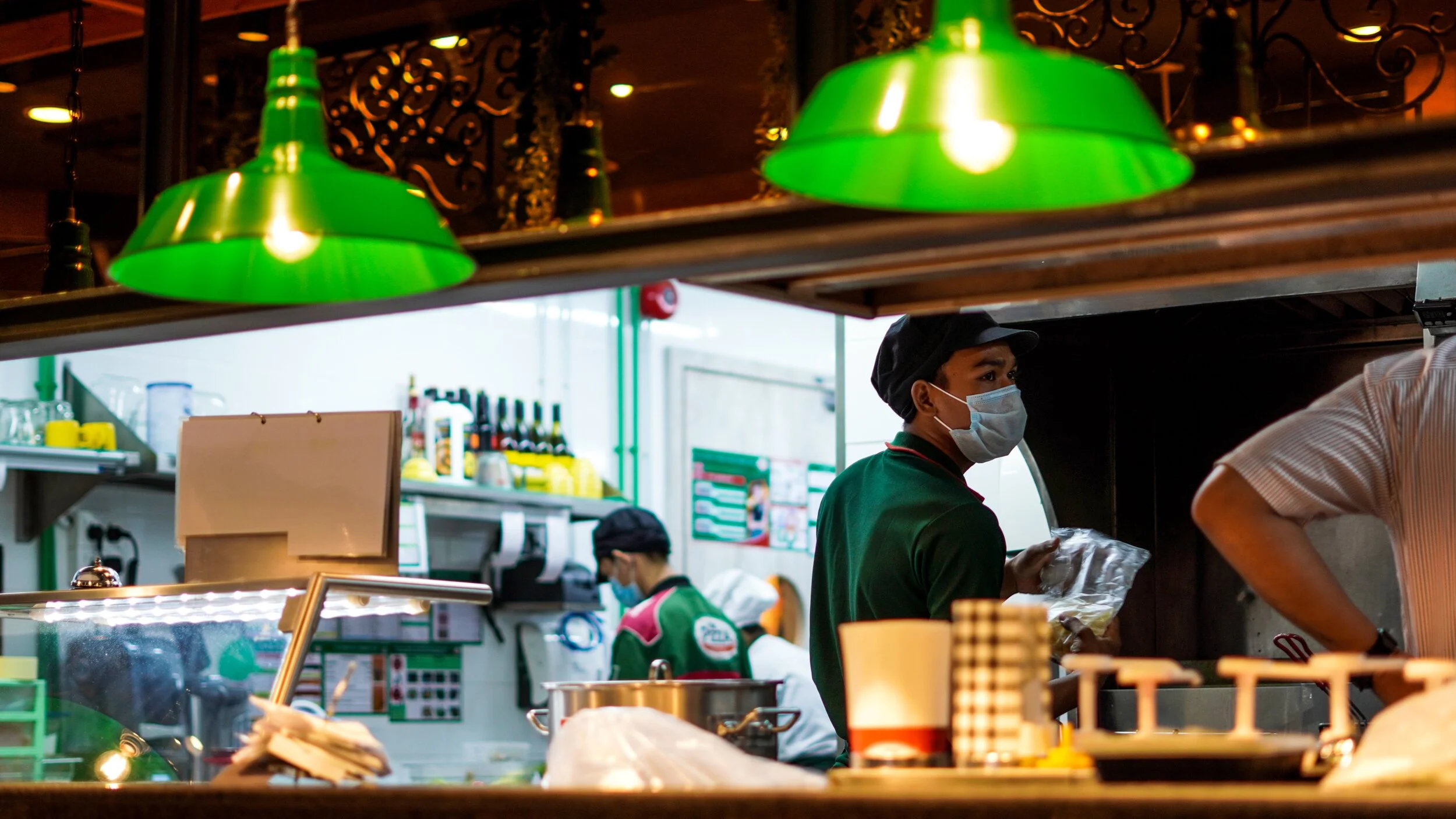How restaurant owners can improve guest experience, be more efficient, and increase profitability through an order ahead reservations program.
By Raideesha Francis Entrepreneur Media Entrepreneur Leadership Network Writer
How restaurant owners can improve guest experience, be more efficient, and increase profitability through an order ahead reservations program.
By Raideesha Francis Entrepreneur Media Entrepreneur Leadership Network Writer
A legacy of thriving and surviving through uncertain times.
By Raideesha Francis Entrepreneur Media Entrepreneur Leadership Network Writer

The mindset and lifestyle of your client and customer base should be heavily considered before selecting your next brick and mortar location. Look beyond what is seen superficially, such as a turnkey storefront, a high traffic location, and the dollar value assigned to a plot of land.
The right blend of environment, accessibility, climate, amenities, etc. are physical elements to be considered when creating an atmosphere that is attractive, desirable, and has features that will entice repeat business. The surrounding area must be reflective of the experience that you are creating.
Selecting a space that will best serve you in serving your clientele is one of the most important factors that will be based upon the type of business that you will operate and the preferences of your client or customer base. Understand where the people need, want, and desire what you have to offer and go there. Commercial real estate transactions should never be based upon emotions but on research and facts.
For these reasons, before deciding where your physical brick and mortar location will be cemented, your business' planning phase must be completed and finalized first. A clear concept with a comprehensive written plan will include details and descriptions about the menu of products, services, and amenities that will be available.
With proper planning and strategizing, a cohesive experience could be designed. Confusion in a business' identity is experienced when who you say you are, how you physically show up, and how you present yourself is not in agreement with one another. During real estate and personal transactions, I have personally experienced where the community is, the type of location, the interior design, and the menu of products and services were not complementary. As a result, I never returned.
Each element must be a reflection and a continuation of what your customers enjoy and are accustomed to in a setting that is congruent with their expectations.
In your decision-making, consider how the overall climate, seasonal weather, terrain, and traffic affect your business' accessibility. Seasonal businesses thrive during certain seasons of the year and depend on weather-related changes and conditions to the surrounding environment for their success, especially during prime holidays. Its purpose and use determine an outdoor venue in comparison to an indoor location. As an entrepreneur, another thought is how to utilize this space during the offseason, when you are not in business, but you still have the potential to generate an income.
Think of a plaza, indoor shopping mall, outdoor market, drive-thru, walk-up service only, or standalone location with outdoor dining and an immaculate edible landscape.
As a part of the property selection process, transform your mindset into that of your customer. As you prepare to journey to this address, consider what you might be thinking about on the way there, what all you will experience en route, and what you have to do in preparation to get there. Upon arrival, rate your visibility and how easy it is to enter the premises by pedestrians, by public or private transportation, or by foot traffic.
As they drive up to your establishment, having a great curb appeal might be important. Consider what they should see and how they should feel before entering and immediately upon entering.
Parking options contribute to the decision of whether to make the trek or not. With an understanding of their parking preferences, you could further grade your location based upon what you can offer, such as designated or assigned parking. Also check if there is open parking, street parking, metered, pay by phone, free limited time, a parking garage that is free or paid, spacious parking spaces or tiny slots that could be difficult for them to fit their vehicle in with the risk of damage by other vehicles that would be parked directly next to them. Would you offer curbside service, valet service, a combination of these or free services, too? A great majority of people will leave and never return if it is difficult to access you for your products and services, including if they risk being ticketed or have to pay for a short trip. Just like it does not make sense to put a farming supply store in a metropolitan area, don't put your business somewhere where it can't or won't be appreciated or thrive.
A strategic approach and a mutually beneficial relationship with neighboring businesses could be establishing yourself in a location with complementary businesses that will contribute to your success. Survey the prospective area for possible relevant establishments.
For a culinary-focused business, it will depend on your concept and menu of what you would consider complementary. A restaurant could thrive in an area with retail shopping outlets, a densely populated office building, and a residential community with disposable income. A dessert-only setup or bar complements your business if you don't offer these selections on your menu. Entertainment and sporting venues such as indoor skydiving, a concert hall, cultural events, and a performing arts center are also complementary if they don't sell food and beverages.
Competing has never been a part of my personality because I consider it to be counterproductive. When working with clients, I redirect their focus from what possible competitors are doing and instead invest their time and resources into minding their own business literally and figuratively.
Your business is what you have complete control over, and you are the only one that will benefit or suffer from your decisions. Studying your industry is wise; being consumed with neighboring businesses can be stressful.
Study your industry and evolve accordingly. If necessary, be a trendsetter. The decision for your next location should be where your customers are or where they think you should be.
Eating outside of the home is a personal decision that includes conscious and subconscious reasoning. For consumers who do not have a compromised immune system, the decision-making process is much easier.
As a new business, you have a reputation for creating. As an established business, you are known for changing or maintaining. When in a business that deals with something as personal as food, you are only allowed one serious strike in your customer's eyes. An error with food could irreparably damage your business.
Commercial kitchen operators are responsible for keeping the public safe from food contamination, which can range in its forms. Habits, equipment, appliances, tools, utensils, chemicals, etc. used in home kitchens are never to be used in a professional setting and vice-versa.
In working with clients that are establishing a new business or expanding internationally, they seek advice on what is the most important element of their business to work on first. The importance and benefits of creating their systems and processes are explained but are typically never followed through because its true value is dismissed.
In the design phase of your business, you must create policies and procedures around your menu, your customers, and according to your local regulatory requirements. One of the most significant and comprehensive of all systems is based on food safety and sanitation.
In the construction and renovation phase of food service, establishment permits won't be approved until important issues directly relating to food safety and sanitation are done correctly.

As an international food safety instructor, I create a fun learning environment for my participants. In a short period, I have to share much information, so I do it in a manner that presents the information in a fun and accurate way.
Teaching and learning can be done over time to reinforce what is being taught and learned at your business. What you are doing could be a part of your training program and should be documented as proof of training.
Assign a topic staff from various parts of your business. In a full-service restaurant, have a team member from your bar area, front of the house, back of the house, management team, and for a little extra content, a vendor assigns a topic from their respective areas to teach the rest of the staff. Learning from your peers in an informal setting can produce a better learning environment and reduce the anxiety that may come with formal, rigid training sessions. Encourage staff to ask appropriate questions and not shame them for not knowing an answer.
Act like your restaurant is on a game show, choose a host, and the rest of the staff are contestants. Choose whether you will be on teams or if scores will be assigned to individuals. Choose topics and ask trivia questions that reinforce important issues in the front and back of the house operations. You could let the staff know what the topic will be, in advance, and schedule this activity as a part of your next training session. Rewarding winners and participants that perform well with prizes is a great bonus. Team members that might not do as well should not be shamed, but this is a perfect retraining opportunity to empower them to rise up to your company's standards. Anytime could be a learning opportunity, so use them wisely.
People love to say what they would do in a particular situation, but we don't really know what we are going to do until faced with an experience. Preparation is the key to success. Research commonly addressed concerns of customers that patronize your type of business and see how you could improve their customer service experience.
Additional ideas for reinforcing desired behaviors in food safety and sanitation is to assign teams and grade their performance daily, weekly, monthly, or quarterly based on their performance. Then, recognize and/or reward them accordingly. You can also administer impromptu quizzes and provide feedback to your staff about their results. Crossword puzzles could be completed during slow periods when all other work is done, and if customers aren't in your business that requires service. You may also give a visual quiz to spot what's wrong in a picture or identified in a scenario.
This topic in our business is loathed, so let us find fun and interesting ways to approach it while motivating our team members to excel in this important area of business. Reward those who perform to a high standard, just like servers with high ticket sales and top-performing managers. Give your staff a reason to take this seriously beyond because this is a part of their job.

Pride your company as the type that loves exceeding expectations. We appreciate it when a person or company goes above and beyond what is expected of them, and we tend to rate them and their business more highly. The same should be true with food safety and sanitation. The law is a minimum requirement and varies from the federal, state, and local levels.
A working relationship with your local regulatory authority should be established, and they should be consulted before finalizing plans to ensure that they meet or exceed local requirements. Some cooking methods and special processes, like sous vide, require writing a plan to be submitted for approval before implementation.

Customer's awareness of your policies can produce brand loyalty. Proudly announce and share in your business and on your company's website about your commitment to keeping them and their food safe and your premises sanitary.